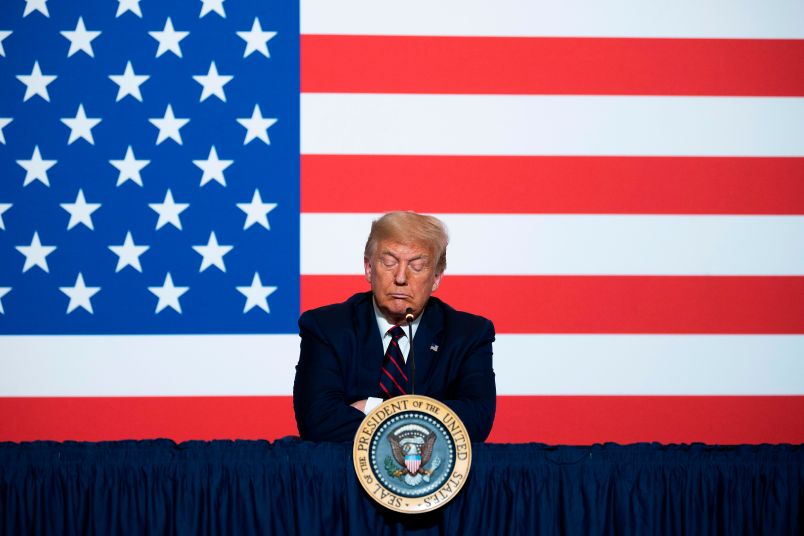Even after a resounding defeat at the Supreme Court and mockery up and down the judicial system, President Trump’s attorneys are sticking with their argument that President Trump is above and beyond criminal investigation.
At arguments before the Second Circuit Court of Appeals Friday morning, personal attorneys of the President pushed on to block a criminal subpoena issued by a Manhattan grand jury for President Trump’s tax returns.
After the Supreme Court held in July that their argument that President Trump is “immune from criminal process” was invalid, one might think that the team would have taken a new legal tack. But under questioning from a panel of three appellate judges, it quickly became clear that Trump was simply raising specific arguments that fit within the same broad principle.
That was most clearly illustrated by questioning early on in the hearing from Judge Raymond Lohier, who pointed out to Trump attorney William Consovoy that the court could limit the grand jury subpoena’s scope if it so wished.
“If we determine that there’s some problem with the scope of the subpoena,” Lohier said, “we are empowered to draw some limitation.”
Consovoy agreed.
Lohier followed up with a question, focusing more on a potential narrowing of the subpoena.
“So if we were to limit the subpoena to tax returns that are for domestic transactions between 2011 and 2016, would that be something that you could live with?” Lohier asked.
“I don’t think so, your honor,” Consovoy replied, as Lohier cut him off and asked, “why not?”
The exchange goes to a key portion of Consovoy’s argument against the subpoena. The President has argued that the Vance probe is limited to the 2016 payments around the Michael Cohen hush money scheme, meaning that the subpoena, which asks for Trump’s tax returns, is far too broad.
The problem with that argument is, as the DA’s counsel pointed out Friday, is that there’s no evidence to suggest that the probe is or ever was limited to the hush money scheme.
But for Lohier, Consovoy’s response appeared to reveal that no subpoena would ever be limited enough to be capable of gaining access to the President’s financial records.
“You just told me that a big problem with the overbreadth issue” was the timing and international scope, Lohier said, before asking whether there was “a request for document that would not, in your view, be overbroad?”
Consovoy said no.
“That’s the problem, that’s the problem,” Lohier replied.
The same dynamic came up elsewhere in the hearing.
At another point, Judge Pierre Leval asked Consovoy why he believed that the subpoena was overbroad, given that tax returns rely on information gathered from all over the world, if the person in question is the owner of a multinational corporation. By the same token, Leval added, broad time periods are relevant, given the role that depreciation of property plays in the tax life of a real estate mogul.
Consovoy replied that a New York taxpayer cannot be subject to a “worldwide audit” while calling the probe a “fishing expedition.”
But, here too, Consovoy went on to argue that Trump had the right to determine the appropriate size and shape of the investigation to which he is subject.
“You cant measure overbreadth in time and scope until you understand what the nature of the investigation is,” Consovoy said. “The president has factually alleged that this investigation is limited to payments in one year.”
In this case, too, the specific argument was about a supposed defect in the subpoena, but the principle was that Trump cannot be investigated.
But the arguments about the subpoena’s breadth leave out the second objection that Trump has raised: that the grand jury issued it “in bad faith to harass the President.”
Throughout the arguments, Consovoy had dropped suggestions that he believed the “bad faith” in which the subpoena was issued was political — a step further than he has argued in briefing before the panel, which held back from saying that explicitly.
At one point, when Consovoy was arguing that the subpoena itself had been “copied word for word” from a House Oversight Committee subpoena, Lohier interrupted him.
“Do you actually allege an improper political motivation?” the judge asked.
Consovoy said yes, but attributed the supposedly copied subpoena to “efficiency reasons.”
“Do you allege another improper political motivation?” Lohier added.
Consovoy said yes, that he believed the subpoena to Mazars “was done in retaliation for the Trump organization’s decision to withhold the tax returns for the subpoena that was issued to it.”
That’s the nub of it: any investigation of the President is itself improper, and the actions of those who respond are illegitimate.
“Motive is notoriously difficult to plead,” Consovoy added.






